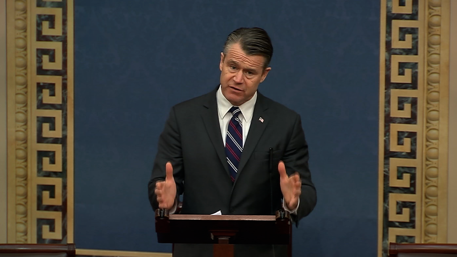VIDEO: Young Calls on Senate to Pass AUMF Repeal Bill Before Final Vote

**Click here or above to watch Senator Young’s floor speech.**
WASHINGTON – This morning, U.S. Senator Todd Young (R-Ind.) spoke on the Senate floor and urged passage of his bipartisan legislation to repeal the 1991 and 2002 Authorizations for Use of Military Force (AUMFs), formally ending the Gulf and Iraq wars. The final vote will occur today.
To watch Senator Young’s full remarks, click here.
Senator Young’s full remarks, as prepared for delivery:
Mr. President, twenty years ago American soldiers were fighting a war in Iraq.
Today, they are there advising Iraq’s army, at the invitation of its government.
Twenty years ago, Iraq was our enemy.
Today Iraq is a strategic partner, an ally in advancing stability across the Middle East.
And yet, according to our laws, we are still at war with Iraq.
This isn’t just the result of an oversight.
It is an intentional abdication by this body of its constitutional role in America’s national security.
Allowing it to continue is a strategic mistake.
A mistake that disrespects the sacrifices of our soldiers and their Iraqi partners too. One that could endanger their work across the Middle East.
It is central to our national security that we set it right.
Here’s why –
Iran has designs on a path to the Mediterranean Sea.
The world’s leading exporter of terror wants to build a route to move manpower and materiel to its proxies across the region.
And once it reaches the sea, it will establish a foothold to threaten Europe.
This terrorism thoroughfare would run through Syria, Lebanon, and of course Iraq.
Iran has sent many thousands of soldiers into Syria to prop up dictator Bashar al-Assad and co-opted regions of that war-torn nation.
Lebanon’s institutions are weak.
Hezbollah, with Iran’s backing, dominates many sectors of the government and the country.
Iraq cannot follow this path. It cannot become a satellite of Iran; and Iran cannot be permitted unrestricted access across the region.
Our advisers are fortifying and working with the Iraqi army to prevent this dangerous future.
But we are undertaking this vital mission with a nation we are still technically at war with.
The authorizations for both the 1991 Gulf War and 2002 Operation Iraqi Freedom are both still on the books.
These are authorizations for long ended wars, passed almost entirely by members of Congress long retired.
These authorizations are outdated. They are a detriment to our national security strategy.
And they are an abdication of Congress’s constitutional role in declaring and ending wars.
In the centuries before our revolution, kings waged wars that their subjects fought.
Reflecting on this history, our founders placed the power to make war not with the executive, but with the legislative branch.
It is here, in Congress, they determined that debate, deliberation, and consensus should precede a decision to go to war…or avert it.
The framers placed this great responsibility in our hands.
And we have let it slip right though them.
By allowing these authorizations to live on long past their purpose, we have forfeited the power to make and oversee wars to the White House.
And presidents of both parties have used them as a justification for military interventions unrelated to their original missions.
So here is the choice before us:
We repeal these authorizations and restore a part of our system of checks and balances…
Or we let them live on, extending a permanent blank check for presidents to bypass Congress in authorizing military action.
By doing the former, we not only take a step towards realigning the function of our government with its Constitution…
We also send an important message to Prime Minister Sudani –
That our interests are shared, our nations are allies.
That we will continue to partner with Iraq to train and equip its army in their fight against ISIS.
And that we oppose Iran’s violations of Iraq’s sovereignty and its ambitions of regional dominance – ambitions that endanger the world far beyond the Middle East.
And let us not forget that in case of urgent national security emergencies, presidents can invoke the Article II War Powers.
In closing, let me reiterate that repealing these war authorizations will give a greater voice to those who we represent.
We live with the possibility every day that our men and women in uniform could be called away to fight, to sacrifice their lives for our freedom.
We dread for that moment to come. But if it does, we must be certain that the American people are united behind the decisions we make.
And that our intentions are clear to our military commanders.
By reclaiming our war powers, by restoring the open, civil-but-passionate debates about matters of war and peace, we will do exactly that.
And our nation and its allies will be stronger and safer because of it.